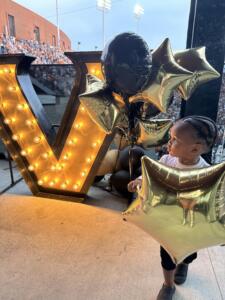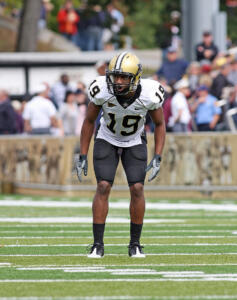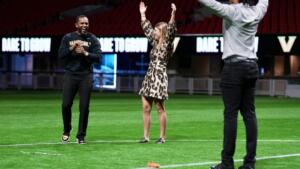NASHVILLE, Tenn. — When Casey Hayward began his decorated, 11-season NFL career back in 2012, the Perry, Georgia, native promised his mother he would complete their four-year plan—that he would return to Vanderbilt and finish his degree.
Good to his word, after his rookie season, Casey Sr. and Tish Hayward’s son earned his remaining credits, walked across the Commencement stage and received his degree in sociology.
But that wasn’t the end of his Vanderbilt story, and it isn’t the end of his Vanderbilt legacy.
Hayward has committed to supporting Vanderbilt Football and Vanderbilt Athletics with $1 million—among the largest gifts of its kind from a former student-athlete who played professionally and the largest ever from a football alumnus.
The gift also fuels Vanderbilt’s Dare to Grow campaign, which has revolutionized Vanderbilt Athletics with transformational support for major facilities, operational enhancements and scholarships and programs for student-athletes. Hayward’s commitment spans four philanthropic pathways:
- Bolstering the Vandy United initiative with support for capital improvements. In recognition of this contribution, Vanderbilt Football will dedicate the Casey Hayward Team Meeting Room.
- Creating an endowed scholarship for student-athletes, the Casey Hayward Athletic Scholarship.
- Establishing the Casey Hayward Fund to support student-athlete summer programming. This includes international study opportunities, which is important to Hayward, who continues to live out his lifelong travel dreams.
- Supporting all student-athletes through the Athletics General Fund.
 An All-American defensive back for the Commodores who played with the Green Bay Packers, San Diego and Los Angeles Chargers, Las Vegas Raiders and Atlanta Falcons, Hayward wanted to give back in a manner that would serve student-athletes for years to come and inspire fellow alumni to get involved. And if earning his degree fulfilled a son’s promise to his mother, this gift is a father’s example to his own nearly 2-year-old son, Cash.
An All-American defensive back for the Commodores who played with the Green Bay Packers, San Diego and Los Angeles Chargers, Las Vegas Raiders and Atlanta Falcons, Hayward wanted to give back in a manner that would serve student-athletes for years to come and inspire fellow alumni to get involved. And if earning his degree fulfilled a son’s promise to his mother, this gift is a father’s example to his own nearly 2-year-old son, Cash.
“You can see all the names around campus, all the family legacies. You see those names, and people understand who this person is and what they did for Vanderbilt,” Hayward said. “That’s how I want to be remembered. My son is going to grow up, and I want my name to be somewhere where he can see it and be proud of his dad. This is about giving back to Vanderbilt, and also a legacy for my son and my family.”
A 40-Year Plan
 Coming off a senior season in 2011 in which he earned All-SEC honors and was named a second-team All-American by multiple organizations, Hayward put his final academic semester on hold to focus on the 2012 NFL Draft. The preparation paid dividends. Selected in the second round by the Packers, he finished third in voting for 2012 Associated Press Defensive Rookie of the Year—foreshadowing a pair of Pro Bowl appearances and AP Second-Team All-Pro honors that followed.
Coming off a senior season in 2011 in which he earned All-SEC honors and was named a second-team All-American by multiple organizations, Hayward put his final academic semester on hold to focus on the 2012 NFL Draft. The preparation paid dividends. Selected in the second round by the Packers, he finished third in voting for 2012 Associated Press Defensive Rookie of the Year—foreshadowing a pair of Pro Bowl appearances and AP Second-Team All-Pro honors that followed.
He was also nominated for the Walter Payton Man of the Year Award for his charitable work, including the Hayward’s Hands organization he founded with his mother.
But if Hayward’s mother was the most important voice reminding of his promise to complete his degree, the late David Williams II ranked a close second. (Laurie Woods, senior lecturer in sociology and Hayward’s academic adviser, also made the medal stand for her dedication.)
Vanderbilt’s athletic director at the time, Williams frequently and affectionately chided Hayward that he, too, made a promise to Tish Hayward that her son would graduate—a promise he intended to see through. A mentor and friend whom Hayward still refers to simply as “Mr. Williams,” the late administrator first introduced him to the 40-year plan. The four years you invest in a degree are important, for sure. But they are only the first step, only the foundation of lifelong growth. Williams encouraged Hayward to think about using his Vanderbilt experience as a road map across decades: not four years, but 40.
Williams died in 2019, just three years after Hayward’s mother. But in giving back, particularly through an endowed scholarship that will continue in perpetuity, Hayward not only honors his mentor’s role in his own ongoing 40-year plan, but carries those lessons forward to those who never knew Williams or Tish Hayward.
“I’m so proud of Casey—and not just for everything he’s accomplished, but for who he is and for his desire to pay it forward,” said Candice Storey Lee, vice chancellor for athletics and university affairs and athletic director. “David Williams influenced everyone he came in contact with, myself included, and I know he would be beaming today. Access to a Vanderbilt degree is life changing, individually and across generations. Coming to Vanderbilt helped Casey reach the full heights of his immense potential as a defensive back, community leader, philanthropist and now father. Thanks to his generosity, generations will have the same opportunity to grow at Vanderbilt.”

Casey Hayward and women’s soccer alumna Grace Jackson attended March’s Dare to Grow Atlanta roadshow and helped guests participate in a field goal and soccer shot challenge. (Vanderbilt University)
Daring to Grow
Like just about all Vanderbilt alumni and supporters, Hayward savored every minute of the football team’s victory over top-ranked Alabama the first weekend of October. Although he was watching from home that night, he instantly recognized the team was playing, tackling and, most of all, scoring like a group playing for each other—and with certainty that they could win. He may have even had a little text-chain fun with friends and NFL teammates who have Alabama connections.
Throughout his career, whenever people learned he went to Vanderbilt, their response was invariably along the lines of, “Oh, the smart school.” He always took it as a compliment.
“I do consider myself pretty smart,” Hayward said with a chuckle.
That’s a blueprint for success, not an obstacle. Just as Hayward’s All-America accolades and NFL success are proof of what’s possible on the field at Vanderbilt, so, too, is this season’s growth under head coach Clark Lea (the two missed each other as teammates by four years).
Hayward wants his gift to help all aspects of the Vanderbilt student-athlete experience and all parts of the athletic department, but it is especially rooted in his appreciation for the football program that shaped him. There are more players like Casey Hayward—eager to grow on and off the field. And there definitely are more nights like this season’s win over Alabama that will bring the university together.
“If you want to compete, you’ve got to have the funds and resources,” Hayward said. “I see Vanderbilt’s plans, and the football plans, for the next five to seven years—the facilities are what it’s all about. It’s all about keeping up and competing. If you see how we’re doing this year, you can tell we’ve got the right coach. Now, it’s all about getting the right players and then having the right facilities. When you have the right facilities and you’re winning and you have the Vanderbilt name? That’s when people want to come.
“Talking about a 40-year plan, that’s what it’s all about.”
After the defeat of Alabama, a visibly emotional Lea talked about the care and investment so many are making to reimagine what’s possible for Vanderbilt Football. That support, he said, created the conditions that fostered the team’s expectation of success on Oct. 5—even against a program that historically embodies the toughest challenge of competing in the SEC.
To help make that happen in Nashville, at his alma mater, Lea said, is why he came back. And it’s why Hayward, after all he’s accomplished, wanted to give back to the football program.
“I’m so grateful for Casey’s support of our program,” Lea said. “As a player and a person, Casey is the epitome of the men we look to develop within Vanderbilt Football. Seeing his name attached to a scholarship and to a physical space in our facility will be a daily reminder of the legacy he continues to build as a Commodore. As a fellow alumnus, I’m honored by his investment in our student-athletes and his desire to pay it forward to the next generation of Vanderbilt Football.”
A Commodore’s Legacy
 For Hayward, four years and a degree was just the beginning of a Vanderbilt legacy that would make his mom, his son and a great many other people proud.
For Hayward, four years and a degree was just the beginning of a Vanderbilt legacy that would make his mom, his son and a great many other people proud.
“Vanderbilt is one of those places that shapes you and prepares you for that 40-year plan because we’re one of the best institutions in the world,” Hayward said. “I want young people coming in to realize they are part of an institution that people hold in high regard. You come to Vanderbilt for a certain reason. I went for football and academics—a lot of people go to be doctors or lawyers, all different type of things. But all of us, we come to Vanderbilt for one reason, and that’s the name and everything it represents.”


